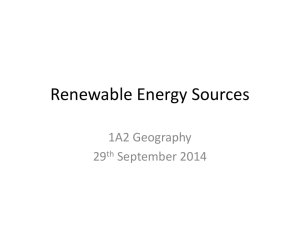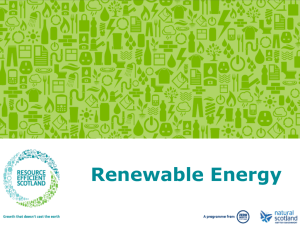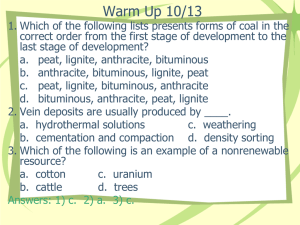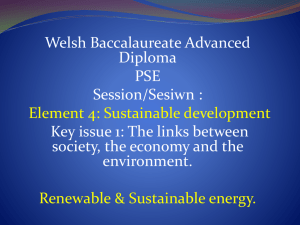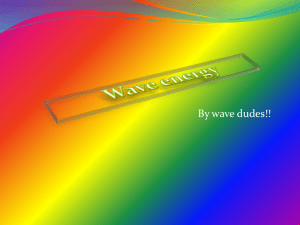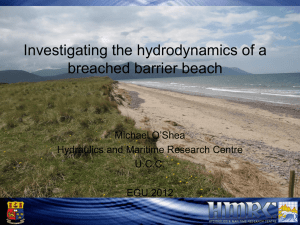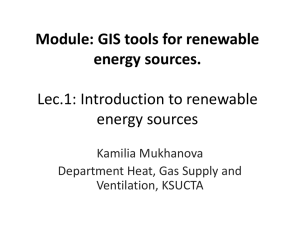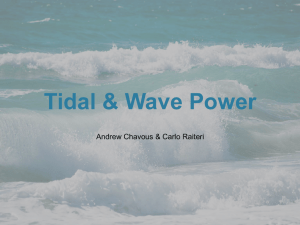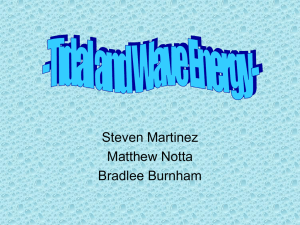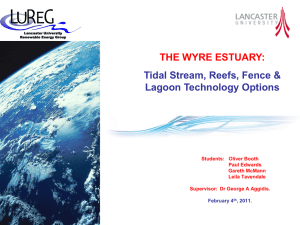Renewable Energy Resources in New Zealand
advertisement
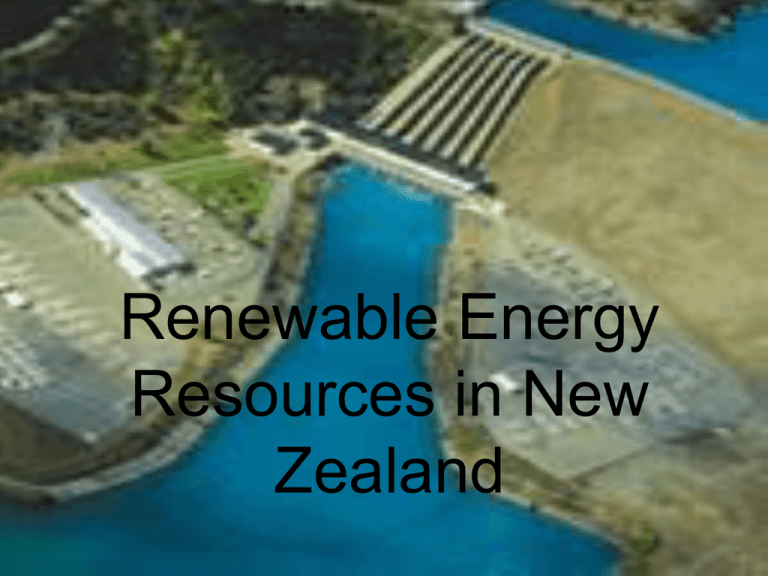
Renewable Energy Resources in New Zealand The Teacher Fellowship Scheme • The New Zealand Sciences, Mathematics and Technology Teacher Fellowship Scheme is administered by the Royal Society of New Zealand for the Ministry of Research Science and Technology. The Scheme is open to fully qualified and registered practicing primary, intermediate and secondary teachers whose work can be related to science, mathematics, social sciences and technology. The Scheme aims to encourage teachers to: • enhance their understanding of and positive attitudes towards science, mathematics, social sciences and technology. • develop both personally and professionally • enhance their awareness and understanding of the applications of science, mathematics, social sciences and technology in enterprise to produce valuable products and services • enhance their awareness and understanding of careers involving science, mathematics, social sciences and technology • promote career options in these areas to their students • share their enhanced knowledge and positive attitudes to science, mathematics, social sciences and technology with colleagues, students and others in the general community Overview • About 30% of New Zealand’s Primary Energy is from Renewable Resources. • Electricity Generation from Hydro accounts for over 70% of Renewable Energy use. • For the foreseeable future, Electrical generation is the most significant area for growth in Renewable Energy Renewable Consumer Energy Use in NZ Source: Renewable Energy Industry Status Report-3rd Edition, EECA Types of Renewable Energy and their uses. Hydro Potential Growth of Hydro • Over 60% of the 755MW high probability potential growth in Hydro generation is in the South Island most of which is in Canterbury • The industry is well developed and new technologies are opening up previously uneconomic resources. • There is plenty of potential for small, local generation schemes, possibly involving irrigation. • Irrigation has caused a shift in electrical distribution • Consenting issues are the major hurdle. Existing and Potential Hydro Sites In Canterbury Animation created by Leanan Wind Energy Current Windfarms Wind Issues • What happens when the wind doesn’t blow? • Noise • Aesthetics • Geographical spread Geothermal North Island Geothermal Resources South Island Geothermal Resources Geothermal Energy Issues • The Industry is mature and in 50 years no resource has been extensively depleted. • Provides a very consistent base load at lower cost than most hydro schemes. • Combined Electrical and Heat generation makes synergies with other industries. • Possibility of Mineral extraction • There is estimated to be 2000-3500MW of untapped resource (largely on Maori land) • Subsidence Bioenergy • Energy from Biological Sources can be separated into main areas: 1. Woody Biomass 2. Municipal/ Food Processing/ Agricultural Residues 3. Transport Biofuels Geographic Distribution of Forestry Resource • Currently, 75% of the woody biomass resource is waste wood burnt to provide energy for wood treatment but there is a small amount of electrical generation. • Firewood amounts for 25% • Short rotation coppicing could provide fuel for electrical generation or pellet fires, especially in combination with effluent disposal on forest floor. • Transport costs impact heavily on economics • Carbon Credits? Energy from Municipal Waste • Christchurch, Auckland and Hamilton currently generate 12MW of electricity from the methane from sewage digestion. • Collection of landfill gases is now mandatory although new designs will be required to make utilisation of these gases economic. The quality and reliability of gas supply creates problems • Burning Organic waste is possible but uneconomic at present and is likely to remain so with waste reduction policies Agricultural Effluent • Tallow from meat work waste could provide up to 5% of New Zealand's Diesel needs. • Tallow is being accepted as an input to NZ refinery. • Bioethanol is currently produced from whey but this will meet less than 0.5% of NZ transport needs. • Small scale digesters could produce local energy but the biggest advantages are in waste reduction. Handling costs are significant. • Cropping specifically for fuels is unlikely in NZ but research is being done into cellulose based biofuels? Biogas as a transport fuel? Solar Energy Four ways of using solar energy. Solar Hot Water Heating Passive Solar Heating Photovoltaic High Temperature Solar Steam Plant http://www. niwascienc e.co.nz/edu /resources/ climate/radi ation/ Wave and Tidal Energy Wave and Tidal Energy Wave Energy • This is a huge untapped source of energy • The first commercial wave energy plant is currently being developed in Portugal using Pelamis, a UK device • New Zealand has one of the best wave energy resources in the world with averages of up to 50kW per metre. • It is a reasonably predictable resource • Resource is not normally near to grid • Getting power ashore is difficult but NZ has expertise in harsh marine environments. • It is a very difficult and damaging environment • Wave power may be an ideal source for remote costal settlements • IRL are currently building a prototype wave generator. • Resource consent issues have yet to be addressed. • Australia has a shore based prototype working at Port Kembla. Tidal power • NZ’s small 2-3m tidal range limits this form of generation however some sites, e.g. Cook Strait have significant tidal flows. At least one New Zealand company is exploring the possibility of placing turbines in the Strait. • Tidal barrages or impoundment are unlikely to be economic or environmentally sustainable Kaipara Harbour' by Sarah McBeath Kaipara Harbour Tidal Scheme Resource consent has been lodged for a 200 turbine, 200MW scheme in the mouth of the Kaipara Harbour. Storage of Energy • • • • Hydrogen and Fuel Cells High Temperature Thermal Storage Fly Wheel Battery Resources EECA: www.eeca.govt.nz/renewable-energy/index.html NZ Wind Energy Association (NZWEA): www.windenergy.org.nz Aotearoa Wave and Tidal Energy Association (AWATEA): www.awatea.org.nz Solar Industries Association (SIA): www.solarindustries.org.nz Bioenergy Association of New Zealand (BANZ): www.bioenergy.org.nz New Zealand Geothermal Association (NZGA): www.nzgeothermal.org.nz International Hydropower Association (NZ)
